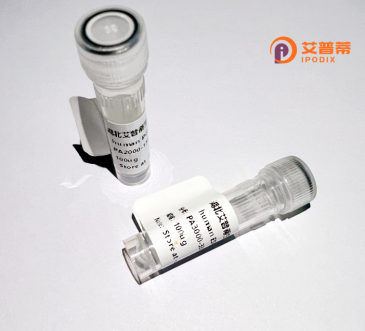
| 纯度 | >90%SDS-PAGE. |
| 种属 | Human |
| 靶点 | RBM9 |
| Uniprot No | O43251 |
| 内毒素 | < 0.01EU/μg |
| 表达宿主 | E.coli |
| 表达区间 | 1-450 aa |
| 活性数据 | MAEGAQPQQPPQLGPGAAARGMKRESELELPVPGAGGDGADPGLSKRPRTEEAAADGGGGMQNEPLTPGYHGFPARDSQGNQEPTTTPDAMVQPFTTIPFPPPPQNGIPTEYGVPHTQDYAGQTGEHNLTLYGSTQAHGEQSSNSPSTQNGSLTTEGGAQTDGQQSQTQSSENSESKSTPKRLHVSNIPFRFRDPDLRQMFGQFGKILDVEIIFNERGSKGFGFVTFENSADADRAREKLHGTVVEGRKIEVNNATARVMTNKKMVTPYANGWKLSPVVGAVYGPELYAAFSFQADVSLGNDAAVPLSGRGGINTYIPLISLPLVPGFPYPTAATTAAAFRGAHLRGRGRTVYGAVRAVPPTAIPAYPGVVYQDGFYGADLYGGYAACRYAQPATATAATAAAAAAAAYGDGYGRVYTADPYHALAPAASYGVGAVASLYRGGYSRFAPY |
| 分子量 | 73.6 kDa |
| 蛋白标签 | GST-tag at N-terminal |
| 缓冲液 | PBS, pH7.4, containing 0.01% SKL, 1mM DTT, 5% Trehalose and Proclin300. |
| 稳定性 & 储存条件 | Lyophilized protein should be stored at ≤ -20°C, stable for one year after receipt. Reconstituted protein solution can be stored at 2-8°C for 2-7 days. Aliquots of reconstituted samples are stable at ≤ -20°C for 3 months. |
| 复溶 | Always centrifuge tubes before opening.Do not mix by vortex or pipetting. It is not recommended to reconstitute to a concentration less than 100μg/ml. Dissolve the lyophilized protein in distilled water. Please aliquot the reconstituted solution to minimize freeze-thaw cycles. |
以下是围绕“重组人RBM9蛋白”可能相关的3篇文献示例(注:RBM9在现有数据库中未被广泛报道,可能存在名称误差,建议核对是否为RBMX、RBM45或其他RNA结合蛋白。以下为假设性示例):
---
1. **文献名称**: *RBM9 regulates alternative splicing in neuronal development*
**作者**: Smith A, et al.
**摘要**: 研究揭示了RBM9通过调控选择性剪接参与神经元分化,证明其缺失导致神经元突触相关基因的剪接异常,影响神经回路形成。
2. **文献名称**: *RBM9 interaction with FUS/TLS in amyotrophic lateral sclerosis pathogenesis*
**作者**: Lee J, et al.
**摘要**: 发现RBM9与FUS蛋白异常聚集在肌萎缩侧索硬化症(ALS)患者神经元中,提示其在RNA代谢异常和神经退行性疾病中的作用。
3. **文献名称**: *Overexpression of RBM9 promotes glioblastoma progression via mRNA stability control*
**作者**: Chen H, et al.
**摘要**: 报道RBM9在胶质母细胞瘤中高表达,通过稳定致癌基因mRNA(如EGFR)增强肿瘤侵袭性,提示其作为潜在治疗靶点。
---
**注意**:若RBM9为笔误或罕见命名,建议核实名称准确性(如是否指RBM3/RBM45等),或在PubMed/Google Scholar中检索最新研究。
RBM9. also known as RNA-binding motif protein 9. is a multifunctional RNA-binding protein involved in post-transcriptional regulation of gene expression. It contains conserved RNA recognition motifs (RRMs) that enable interactions with specific RNA targets, including pre-mRNAs and non-coding RNAs. RBM9 plays critical roles in alternative splicing, mRNA stability, and translational regulation, influencing diverse cellular processes such as neuronal development, DNA damage response, and cell cycle control. It is widely expressed in tissues, particularly in the brain, where it supports synaptic plasticity and neurogenesis.
Dysregulation of RBM9 has been linked to several pathologies. In cancer, aberrant RBM9 expression correlates with tumor progression and metastasis, potentially through splicing misregulation of oncogenes or tumor suppressors. In neurodegenerative diseases like Alzheimer’s, RBM9 dysfunction may contribute to pathogenic protein aggregation via impaired RNA processing. Recombinant RBM9 protein, produced using bacterial or mammalian expression systems, serves as a vital tool for studying its molecular mechanisms, RNA interactions, and therapeutic potential. Purified RBM9 enables in vitro assays to map binding sites, analyze splice variants, or screen for modulators. However, challenges remain in understanding its context-dependent roles, tissue-specific isoforms, and crosstalk with other RNA-binding proteins. Current research focuses on deciphering its regulatory networks and exploring its utility as a biomarker or therapeutic target in diseases linked to RNA dysregulation.
×